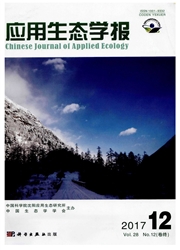

 中文摘要:
中文摘要:
松树与松材线虫互作中,NO作为重要的信号分子参与调控寄主对松材线虫入侵的应答反应,但松材线虫入侵寄主后,是松材线虫还是其代谢产物激发寄主体内NO应答信号尚不明确.本研究用松材线虫活体、线虫分泌物、虫体研磨液等分别接种黑松,研究接种早期黑松体内NO合成酶(NOS)活性和NO含量变化与后期松树症状发展的关系.结果表明:采用虫体研磨液、线虫分泌物处理后黑松体内NOS活性和NO含量均升高;各处理黑松外部均出现感病症状.说明在松树与松材线虫互作中,除线虫活体作用外,线虫体或分泌物中的物质也可激发松树体内NO应答信号的表达,诱导下游应答响应的发生,导致黑松感病.15~25℃条件下,随着温度升高,接种黑松体内NOS活性增强,NO含量升高,感病症状出现较早;随着干旱胁迫程度的增强,接种黑松体内NOS活性、NO含量大致呈逐步升高趋势,感病症状也较早出现.在一定范围内,温度升高和干旱程度加剧可诱发感病黑松体内NO相关信号途径表达增强,并加速病程发展.表明在一定条件下,高温干旱环境有利于松材线虫病的发生可能与寄主体内NO应答信号增强有关.
 英文摘要:
英文摘要:
In the interaction between Pinus thunbergii and Bursaphelenchus xylophilus, nitric oxide (NO) is an important signaling molecule involving in the early response of P. thunbergii to the in- vasion of B. xylophilus. However, it is unclear that whether the NO production by P. thunbergii is triggered by the invaded B. xylophilus or its secreted metabolites. In the present study, the P. thunbergii was inoculated with living B. xylophilus, its secretion, and the suspension of grinded B. xylophilus, respectively, and the nitric oxide synthase (NOS) activity and NO content in the P. thunbergii were detected at the early stage. In all treatments, the inoculated P. thunbergii appeared disease symptoms, and the NOS activity and NO content in the P. thunbergii inoculated with B. xy- Iophilus secretion and grinded B. xylophilus suspension increased, suggesting that besides living B. xylophilus, its contents or secretion could also trigger the expression of NO response signal in P. thunbergii, inducing the downstream response and causing the disease development of P. thunbergi. With the increasing temperature at 15-25 ℃, both the NOS activity and the NO content in inocula- ted P. thunbergii increased, and the disease symptoms appeared 'earlier. The same patterns of NOS activity, NO content, and disease symptoms were also observed under increasing drought stress. It was the suggested that within a definite range NO signal expression in inoculated P. , increased temperature and drought stress could enhance thunbergii and accelerate its disease development, andthus, the disease development of inoculated P. thunbergii under high temperature and drought con- dition could be related to the enhancement of the NO response signal in the host.
 同期刊论文项目
同期刊论文项目
 同项目期刊论文
同项目期刊论文
 期刊信息
期刊信息
